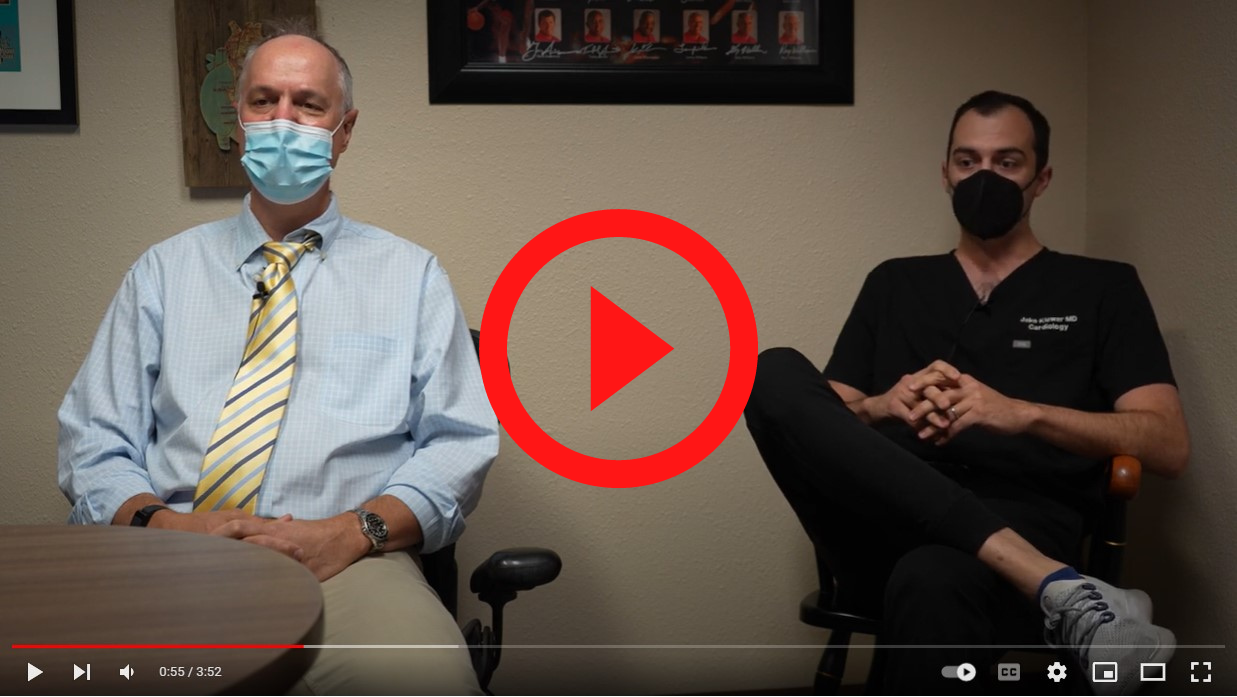Outgoing News Feed for Touchscreen
Sarver Heart Center Publishes FY25 Annual Report Highlighting Growth, Innovation, and Impact 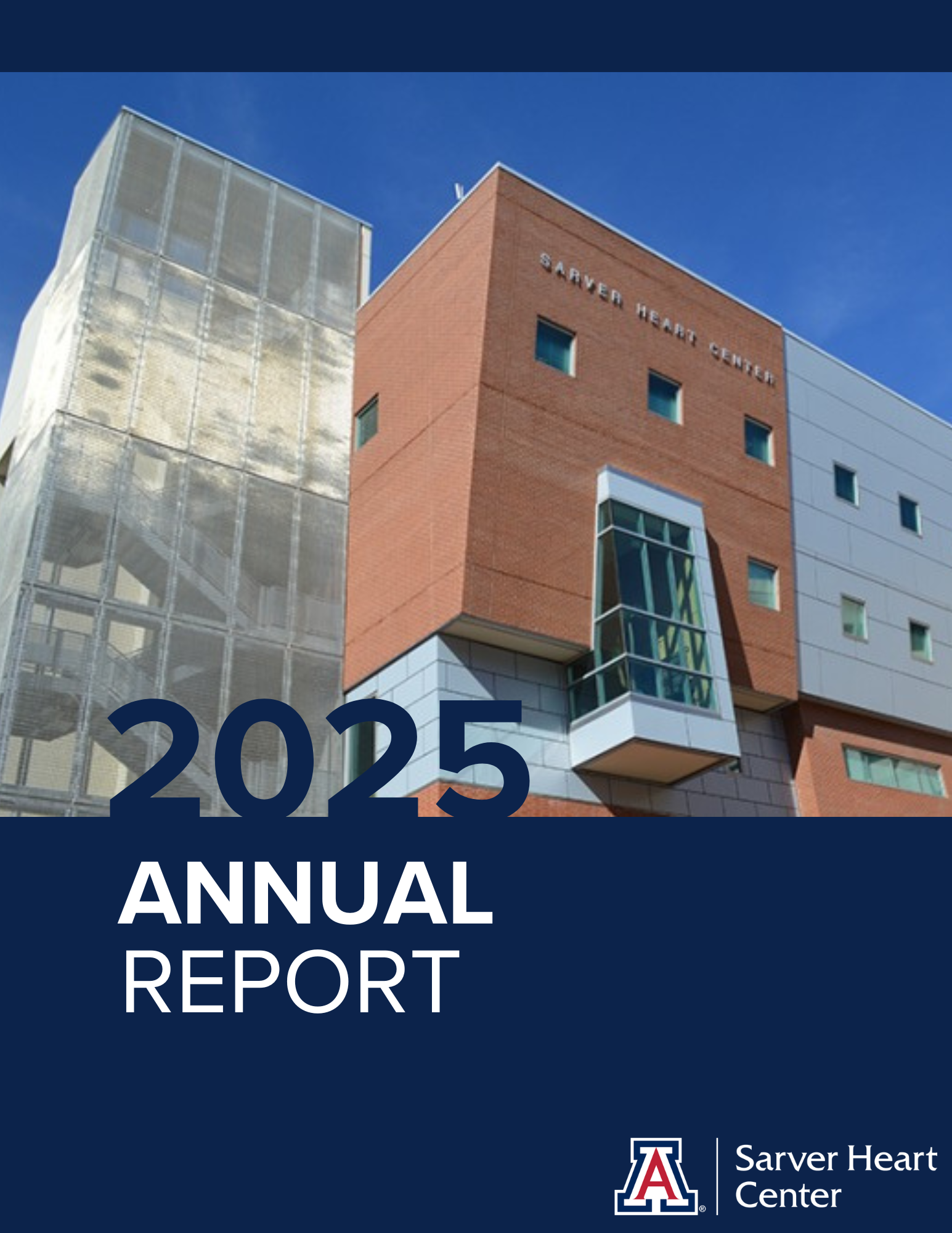
The Sarver Heart Center is proud to share its FY25 Annual Report, reflecting a year of exceptional progress across clinical care, research, and education. Under Dr. Hesham Sadek's leadership, the Center has expanded its research portfolio, launched forward-thinking training programs, and deepened its commitment to world-class cardiovascular care. Notable accomplishments include new grant funding, international academic collaborations, and continued advances in heart regeneration, heart failure, and health equity research.
This year also marked growth in clinical services at Banner University Medical Center under strong leadership, helping to improve access and elevate the quality of cardiovascular care for patients across Arizona. As always, the Center’s success is made possible through the dedication of faculty, staff, students, donors, and volunteers. We invite you to explore the full report and celebrate another year of life-saving innovation and progress.
View the 2025 Annual Report here.
![Promotional logo for the new Sarver Steppers walking club at La Encantada Shopping Center in Tucson [Promotional logo for the new Sarver Steppers walking club at La Encantada Shopping Center in Tucson]](/sites/default/files/sarver-steppers-at-la-encantada_02.21.25_475x356px_0.jpg) The newest walking club in Tucson debuted at 8 a.m., Friday, Feb. 22, at the La Encantada Shopping Center – the Sarver Steppers in partnership with the University of Arizona Sarver Heart Center and local vendors Haute Coffee and Lululemon.
The newest walking club in Tucson debuted at 8 a.m., Friday, Feb. 22, at the La Encantada Shopping Center – the Sarver Steppers in partnership with the University of Arizona Sarver Heart Center and local vendors Haute Coffee and Lululemon.
Cara Deery, Sarver’s senior program manager for outreach and education, considered it a very successful launch with 11 people attending from the nearby community for the kickoff event. She noted that prizes are presented including a pair of shoes from Lululemon for the high stepper of the month.
“I am thrilled about the success of this event and the opportunities it presents to the U of A and the center for health promotion, community building and marketing,” Deery added. “The group was thrilled to participate today!”
![Three of the 14 people – including retired cardiologist Dr. Tom Lassar's wife, Jane –who took part in inaugural Sarver Steppers at La Encantada walking club event [Three of the 14 people – including retired cardiologist Dr. Tom Lassar's wife, Jane –who took part in inaugural Sarver Steppers at La Encantada walking club event]](/sites/default/files/styles/very_small_image/public/sarver-steppers-at-la-encantada_image_1_675x900px.jpg?itok=KrPOiUq1) Among participants was Tom Lassar, MD, a retired Sarver Heart Center member and faculty in the Division of Cardiology. His wife, Jane, is an avid walker at La Encantada and helped establish the initial connection between Jill Harlow, the mall’s activity manager, and the center, Deery said.
Among participants was Tom Lassar, MD, a retired Sarver Heart Center member and faculty in the Division of Cardiology. His wife, Jane, is an avid walker at La Encantada and helped establish the initial connection between Jill Harlow, the mall’s activity manager, and the center, Deery said.
La Encantada’s prior collaboration with Tucson Medical Center as a partner for a walking event ended during the COVID-19 pandemic, and the center was looking for a new partner.
![Signage at La Encantada Shopping Center promoting its new Sarver Steppers walking club [Signage at La Encantada Shopping Center promoting its new Sarver Steppers walking club]](/sites/default/files/styles/very_small_image/public/sarver-steppers-at-la-encantada_image_2_675x900px.jpg?itok=aElKSwIh) The Sarver Steppers will be walking daily between 6 and 9 a.m., and the frequency of the walks-with-a-doc activities is still to be determined. They’ll be planned for Fridays and will occur weekly, monthly or quarterly. And Sarver can bring any number of clinicians or researchers to participate.
The Sarver Steppers will be walking daily between 6 and 9 a.m., and the frequency of the walks-with-a-doc activities is still to be determined. They’ll be planned for Fridays and will occur weekly, monthly or quarterly. And Sarver can bring any number of clinicians or researchers to participate.
Click here for a flyer to share for the Sarver Steppers. And you can see maps of walking routes at this link. There are two routes, each 0.3 of a mile in length – the Catalina Route and Saguaro Route – and a combined Ocotillo Route, including stairs, that also is 0.3 of a mile long.
![Sarver Heart Center outreach manager Cara Deery helps a Sarver Stepper with her Strava app to track her fitness activities. [Sarver Heart Center outreach manager Cara Deery helps a Sarver Stepper with her Strava app to track her fitness activities.]](/sites/default/files/styles/very_small_image/public/sarver-steppers-at-la-encantada_image_0_675x900px.jpg?itok=-VLkAHyy) Sarver Stepper participants are encouraged to download the Strava app, which offers a free service to track and record your fitness activities like walking, running, cycling and hiking. Social features also allow you to share your activities with friends and join clubs like the Sarver Steppers.
Sarver Stepper participants are encouraged to download the Strava app, which offers a free service to track and record your fitness activities like walking, running, cycling and hiking. Social features also allow you to share your activities with friends and join clubs like the Sarver Steppers.
The initial 14 people recorded as members on the Strava club for the Sarver Steppers is expected to grow rapidly over the next week or so, Deery said.
“Members were excited at the opportunity to meet other walkers. One member, a 92-year-old woman named Charlotte, recently had to give up driving and is excited for the social and fitness benefits offered by the Sarver Steppers group. Her daughter, Karen, is the wife of Ken Wilund, PhD, director, U of A School of Nutritional Sciences and Wellness, whose interested in partnering on the initiative, too,” Deery added.
![Drs. Raj Janardhanan, Iniya Ranendran and Craig Weinkauf [Drs. Raj Janardhanan, Iniya Ranendran and Craig Weinkauf]](/sites/default/files/drs.janardhanan-rajendran-and-weinkauf_310x150px.png) She thanked Sarver physicians for their participation in offering quotes to help inspire the walkers. Those included:
She thanked Sarver physicians for their participation in offering quotes to help inspire the walkers. Those included:
■ “Movement is medicine.” | Raj Janardhanan, MD, MRCP, a professor of medicine in the college’s Division of Cardiology who is echocardiography director and medical director for non-invasive cardiac imaging at Banner – University Medicine Tucson.
■ “Walking not only improves cardiovascular health but also shown to improve mental and emotional health.” | Iniya Ranendran, MBBS, MPH, an assistant professor in the Division of Cardiology and a fellow in the Advanced Cardiovascular Imaging Fellowship Program.
■ “Use it or lose it!” | Craig Weinkauf, MD, PhD, an associate professor in the Division of Vascular Surgery at the Department of Surgery and member of the U of A Graduate Faculty.
Count your steps, count your points for prizes
Download the free Strava app, join the Sarver Steppers “club,” and track your daily walk from one of the routes at La Encantada while enjoying the cool morning air.
- Steps must be recorded only at La Encantada to be eligible for prizes.
- About the routes:
- The Catalina (Upper Route): Length is 0.3 miles; three times around is approximately 1 mile.
- The Saguaro (Lower Route): Length is also 0.3 miles; three times around is approximately 1 mile.
- The Ocotillo (Upper & Lower Route): This involves a combination of using the Lower and Upper Routes to get the full mile. Length is also 0.3 miles; three times around is approximately a mile. This is the advanced route since it includes stairs.
- Record your walk at La Encantada, use hashtag #SarverSteppers and post it on the Sarver Steppers “club” on the Strava app for a chance to win prizes!
- Leashed pets are welcome.
See QR code on maps PDF for alternate way to download the Strava app. Click image to enlarge.
Questions? Contact Cara Deery, senior program manager, outreach and education, Sarver Heart Center, 520-626-2901 or caradeery@arizona.edu
April 29, 2024
By David Bruzzese, UArizona College of Medicine – Tucson
The University of Arizona College of Medicine – Tucson has appointed Hesham Sadek, MD, PhD, as the new director of the Sarver Heart Center and chief of the Division of Cardiology, effective May 1.
Sadek brings a wealth of experience and an impressive research portfolio from UT Southwestern Medical Center in Dallas, where he served as associate director of the Center for Regenerative Science and Medicine and a professor of internal medicine/cardiology with joint appointments in biophysics and molecular biology.

Sadek’s appointment marks a significant milestone in the college’s ongoing efforts to enhance its cardiac care and research capabilities.
“We are thrilled to welcome Dr. Sadek to our team,” said Michael M.I. Abecassis, MD, MBA, the Humberto and Czarina Lopez Endowed Dean of the College of Medicine – Tucson. “Dr. Sadek will not only lead revitalization of the Sarver Heart Center, but also help build a new comprehensive cardiovascular research institute, anchored within the center, which will advance our mission to pioneer new therapies and help provide top-tier care to our patients.”
Sadek is recognized internationally for his research into the activation of mechanisms involved in the regeneration of damaged heart muscle. His seminal discovery of the newborn mammalian heart’s ability to regenerate has significantly altered the landscape of cardiac biology. His current research includes advancing drug discovery to enhance heart regeneration and address rare genetic mutations causing heart failure.
His work has been continuously funded by the National Institutes of Health since 2011, and his clinical expertise in echocardiography and heart muscle function ensures that cutting-edge research translates into superior patient care.
“As a physician-scientist, Dr. Sadek brings with him experience and expertise to provide and enhance the academic cardiovascular care and education within our community while also providing access to next- generation research and understanding in heart failure and regeneration. We are pleased to add his leadership and vision to the Banner – University Medicine and Sarver Heart teams,” said Venkata “Bob” Evani, MD, CEO of Banner – University Medical Group and president of Banner Academics.
Sadek’s dedication extends beyond the lab and clinic to the classroom and mentorship. He has guided nearly 100 students and professionals in their careers, and his arrival at the College of Medicine – Tucson is expected to enrich the training and development of the next generation of cardiovascular specialists and health care professionals.
“We are extremely fortunate to recruit someone of the caliber of Dr. Sadek,” said James K. Liao, MD, Department of Medicine chair, the Robert S. and Irene Flinn Endowed Professor in Medicine, and a member of the Division of Cardiology faculty and Sarver Heart Center. “He brings an incredible amount of energy and enthusiasm to our clinical cardiology program, and his innovative ideas will surely transform the Sarver Heart Center into a preeminent research institution. I am excited about his leadership and vision, and look forward to working with him to make this happen.”
Sadek also is associate editor of the cardiovascular journal Circulation and serves on several American Heart Association committees.
Contact:
David Bruzzese
University of Arizona College of Medicine – Tucson
520-626-9722, dbruzzese@arizona.edu
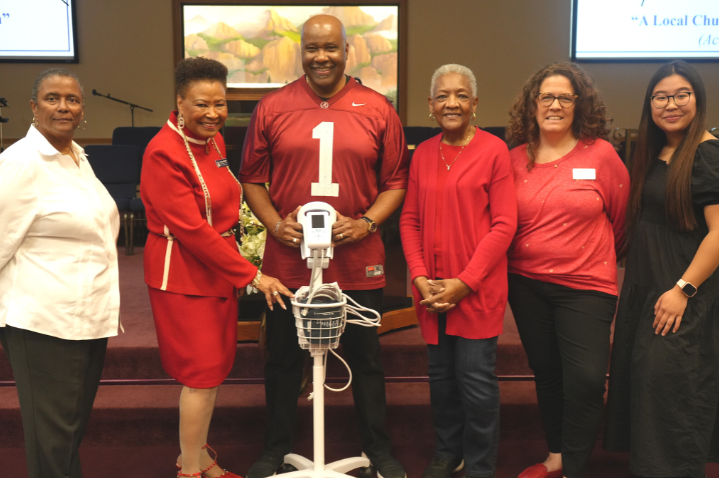 A donation by the Sarver Heart Center Minority Outreach Program and the American Heart Association provides the congregation at Rising Star Baptist Church, a predominantly African American church located in South Tucson, free access to measure their blood pressure at any time they are at the church.
A donation by the Sarver Heart Center Minority Outreach Program and the American Heart Association provides the congregation at Rising Star Baptist Church, a predominantly African American church located in South Tucson, free access to measure their blood pressure at any time they are at the church.
Program members and their community partner AHA donated a standalone blood pressure monitoring unit. Wanda F Moore, Founder and Chair of the Minority Outreach Program, and Cheryl Alli along with Katy Wood and Malina Koukhamsay of AHA presented the machine to Pastor Amos L. Lewis after Sunday service on February 12, 2023. The monitor is located inside of Rising Star in its medical room. Information on how to properly use the machine, monitor and lower your blood pressure is also provided to visitors.
High blood pressure, known as the “silent killer,” is the leading cause of stroke. African American men and women have higher rates of high blood pressure than any other racial or ethnic group, and are more likely to be hospitalized for high blood pressure, according to the Centers for Disease Control and Prevention. Yet, many do not know they have it, because they don’t have symptoms.
Over 1,000 members belong to Rising Star Baptist Church, at 2800 East 36th Street in Tucson. According to the Church’s website, members are predominantly African American, but people from all backgrounds, cultures and religions are welcome.
“The Sarver Heart Center is so proud of Wanda F Moore, and the Minority Outreach Program, for its continued dedication to providing important life-saving heart health information to the Tucson community,” states Carol Gregorio, PhD, interim Director of the Sarver Heart Center. “The installation of the blood pressure machine demonstrates the importance of monitoring your blood pressure and eliminates barriers that may prevent people from doing so.”
Funding for the blood pressure monitor was provided by the American Heart Association Arizona.
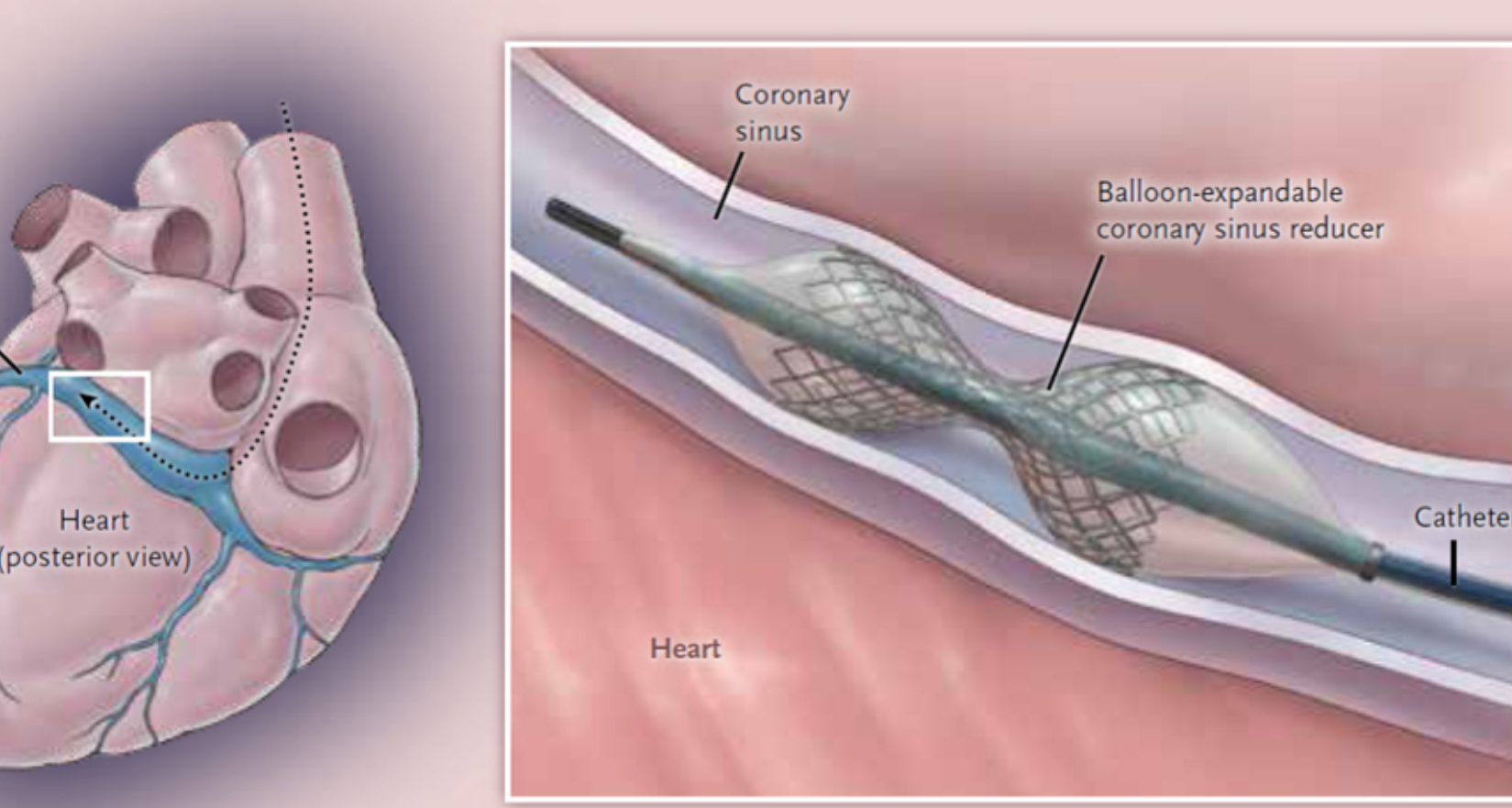
The University of Arizona Sarver Heart Center will participate in a groundbreaking trial (COSIRA II) in the United States, focused on the safety and efficacy of a device for patients with refractory angina pectoris, a medical condition that causes chest pain due to a lack of sufficient blood supply to the heart.
The device, titled Coronary Sinus Reducer TM (Neovasc Inc, Minneapolis, MN), is an hourglass-shaped stent placed in the coronary sinus (the venous system of the heart). During the randomized sham trial, which is considered the best quality trial for devices, all participants will undergo the same process in the cardiac catheterization laboratory, but only half will receive the device, through a neck vein access point with device implanted in the coronary sinus of the heart. This means the patient and the physician tracking their results do not know if they have the device implanted in them or not. Michel Corban, MD, the principal investigator for the trial, states this process ensures evaluations of the patients’ change in symptoms and quality of life are objective.
380 patients are needed to participate in the trial. Each participant will be followed up for a year. To qualify, patients will need to have obstructive coronary artery disease (blockages in the big fat vessels of the heart) and are unqualified for stents and/or surgery. Patients with obstructive artery disease may also qualify if they are considered too high of a risk for bypass surgery or a stent.
“Currently, this patient population only has one option, which is medical therapy, and if medical therapy doesn’t work, then there is nothing else we can offer,” said Dr. Corban. There are four classes of medication therapies. Patients need to be taking at least three of the classes of medications with persistent symptoms to qualify to participate in the study.
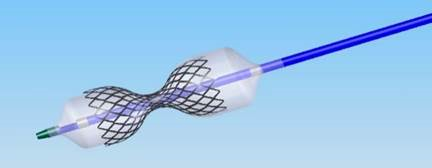 The Food and Drug Administration has previously granted a breakthrough designation for the device. According to the FDA, this designation is for certain medical devices that provide for more effective treatment of life-threatening or irreversibly debilitating diseases or conditions. The goal is to provide patients and health care providers with timely access to these medical devices by speeding up their development, assessment, and review.
The Food and Drug Administration has previously granted a breakthrough designation for the device. According to the FDA, this designation is for certain medical devices that provide for more effective treatment of life-threatening or irreversibly debilitating diseases or conditions. The goal is to provide patients and health care providers with timely access to these medical devices by speeding up their development, assessment, and review.
The Sarver Heart Center is one of 15 current locations participating in the COSIRA-II trial, and begins recruitment in January 2023. “Collaboration is extremely important because not a single center can enroll in a timely manner the number of patients needed to power the study. If all the centers do not work together, the trial simply cannot get done," said Corban. This is the only trial addressing refractory angina with obstructive coronary artery disease and no revascularization options currently at the Sarver Heart Center.
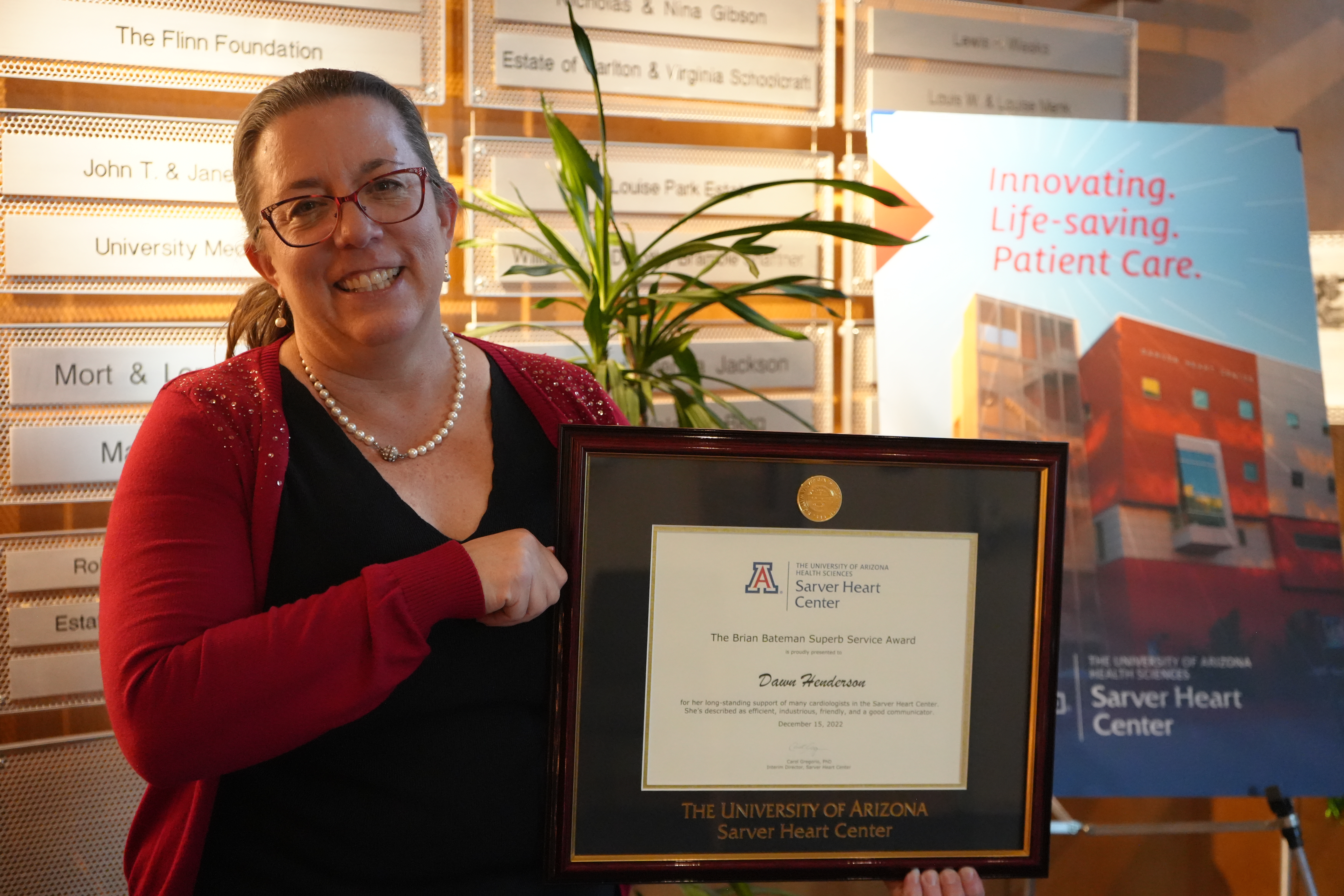 The Sarver Heart Center would like to congratulate Dawn Henderson, administrative associate since 2016, who was honored for her efficiency, friendliness, and communication skills as the 2022 recipient of the Brian Bateman Superb Service Award. Many faculty nominated her.
The Sarver Heart Center would like to congratulate Dawn Henderson, administrative associate since 2016, who was honored for her efficiency, friendliness, and communication skills as the 2022 recipient of the Brian Bateman Superb Service Award. Many faculty nominated her.
“Dawn is a beloved staff member here at the Sarver Heart Center,” said Carol Gregorio, PhD, interim Director of the Sarver Heart Center. “The physicians she supports praise her dedication to scheduling coverage within Cardiology, which is an absolutely essential role in healthcare.”
Nominators Rajesh Janardhanan, MD and Talal Moukabary, MD, nominated Henderson to be recognized for her exceptional work. Craig Hoover, MD, stated he has only been at the University of Arizona and the Sarver Heart Center for a year, but during this time, he has witnessed Dawn has assumed more responsibilities than ever due to the loss of faculty and support staff. Joseph Alpert, MD, said in his nomination letter “I am sure my life would be a huge mess if it were not for her monitoring and assisting me in a hundred ways. She is one of the very best administrators that I have had the pleasure of working with during my 30 years at the U of A and Sarver.”
Brian Bateman served as director of development for the Sarver Heart Center for nearly a decade. A key ingredient to his success was the “whatever it takes” attitude that he instilled in those with whom he worked. The award is a wonderful way to acknowledge and thank those who remove barriers and help fulfill the mission of the Sarver Heart Center in the best possible way. Dawn Henderson embodies the qualities of this recognition.
The relationship between Scott Klewer, MD and Jacob Klewer, MD has transformed over the last year. After years of being apart, the father and son are now co-workers at the University of Arizona College of Medicine – Tucson.
In the year since Dr. Jake Klewer and his family moved back to Tucson, his father says their relationship has grown. “It’s been tremendously rewarding,” Dr. Klewer said. “I get to see him much more often.”
“We’ve always had a lot of similarities and interests outside of work,” Dr. Jake Klewer said while sitting in his father’s office. “Now we can talk about work. It definitely strengthens things.”
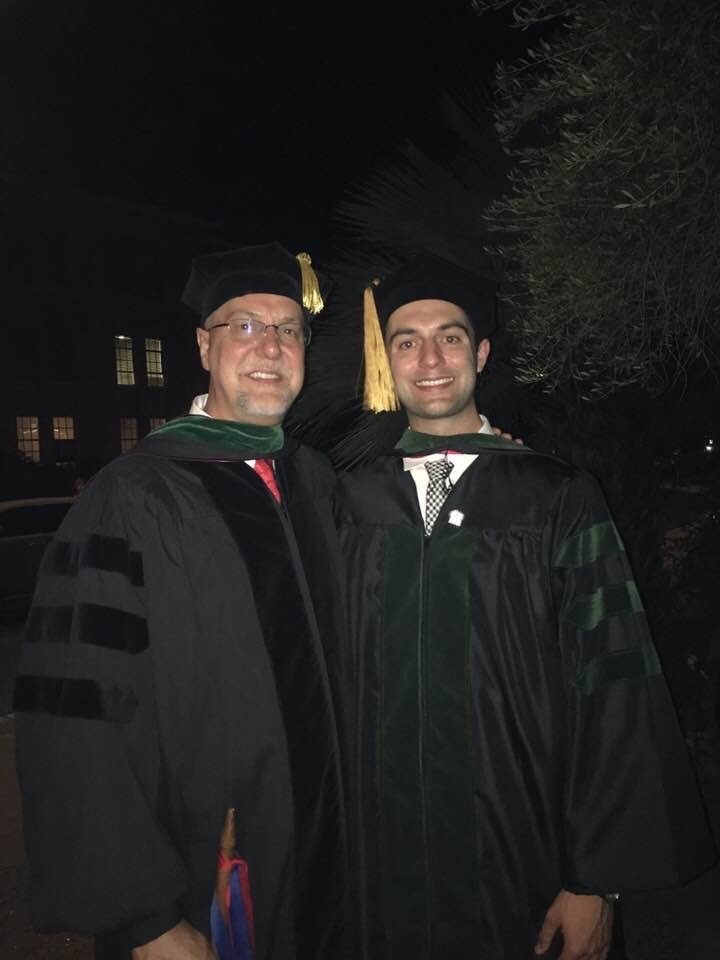 Scott Klewer, MD, Division Chief of Pediatric Cardiology in the College of Medicine – Tucson, started his career at UArizona in 1996. He said while working in pediatric cardiology and having young children, there were times when work would have an impact on him. “You would just come home and feel grateful that our children were healthy,” he recalled.
Scott Klewer, MD, Division Chief of Pediatric Cardiology in the College of Medicine – Tucson, started his career at UArizona in 1996. He said while working in pediatric cardiology and having young children, there were times when work would have an impact on him. “You would just come home and feel grateful that our children were healthy,” he recalled.
Growing up, Jake and his brother would tag along with their father in the lab on weekends. They would work on the computer or watch a video while Dr. Klewer conducted experiments.
Both Dr. Scott and Jake Klewer attended the University of Arizona for medical school.
“Initially I thought I wanted to do orthopedic surgery, but at the beginning of my third year when I started rotations and clerkships, I got exposed to internal medicine. It clicked,” Dr. Jake Klewer said. “I realized I liked the medicine aspect a lot more than I originally thought. Cardiology just made sense.”
Dr. Jake Klewer is a first-year cardiology fellow at the Sarver Heart Center.
There have been a couple of times the father and son have overlapped and taken care of patients together.
“In the elevator, people will start looking at me, looking at my nametag and ask, ‘are you…’ and I finish their sentence saying ‘yes, that’s my dad,’” Dr. Jake Klewer said.
“Patients I’ve taken care of for decades say they met my son and I asked, ‘how did he do?’” Dr. Scott Klewer said. “They said, ‘he’s a great doctor,’ and that’s really fantastic to hear.”
This year is the first Father’s Day they will spend together in Tucson as three generations. The elder Klewer is now a grandfather after Jake and his wife welcomed a son two years ago.
“It will be a good time, spending Father’s Day with family,” Jake said. “It’s really special.”


